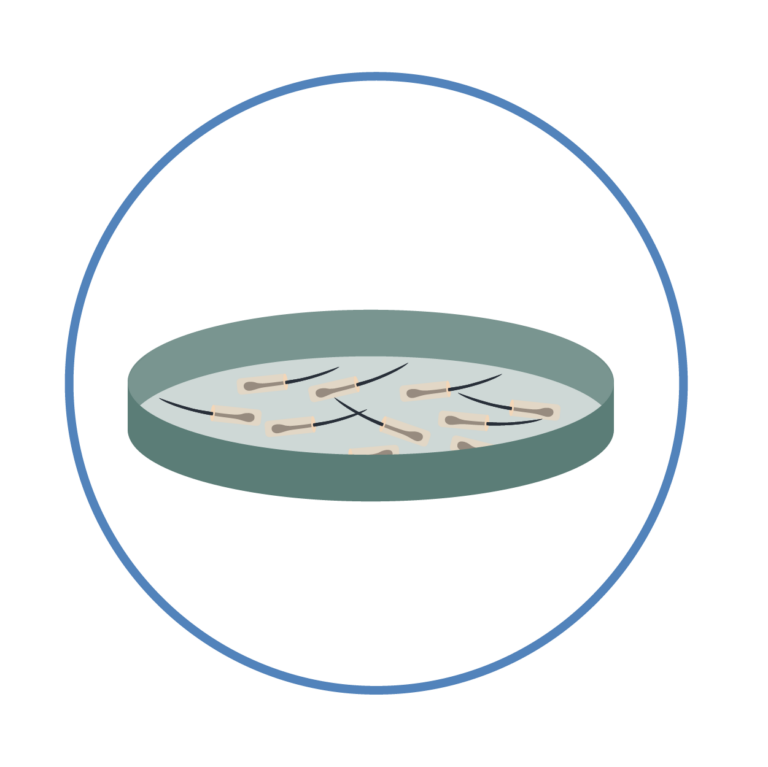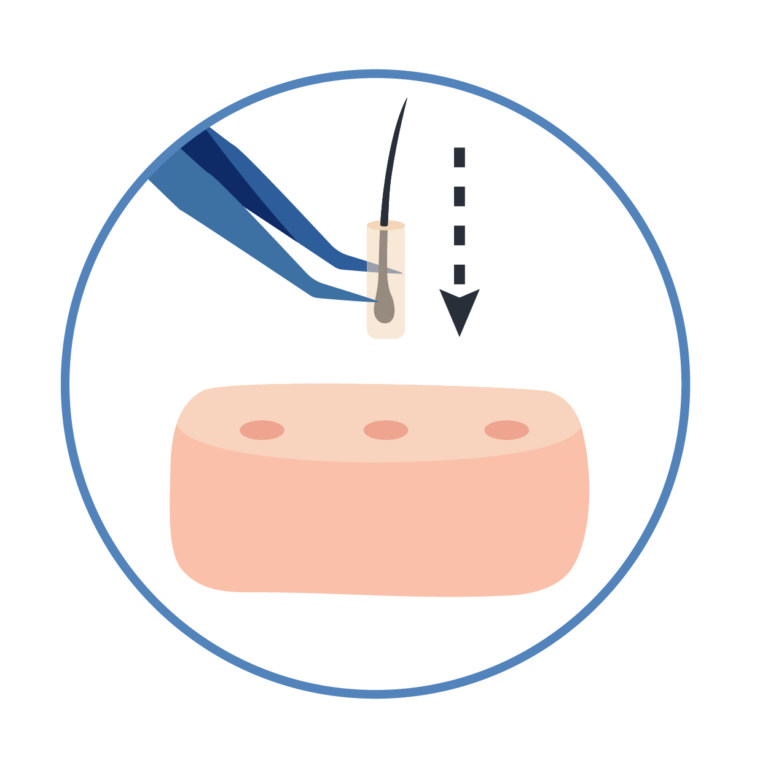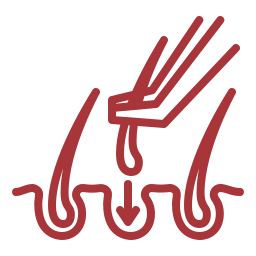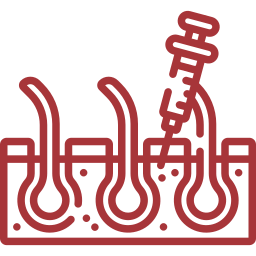HAIR TRANSPLANT
Hair Transplant involves removing healthy hair follicles directly from a donor area on the scalp which is also called permanent area and grafting them onto the bald or thinning areas.
Male pattern baldness is something that we treat in our clinic very often. There are many types of male pattern baldness, from stage 1 to stage 7 according to the Norwood classification. We provide treatments for all stages, and we can either do a fully-shaven or a partly-shaven FUE transplant.
Let us call you
What is Male Pattern Baldness?
Male Pattern Baldness is the most common form of hair loss in case of men. In this condition, the hair loss usually begins with a receding frontal hairline at both the corners in a U-shaped or M-shaped pattern. It can also begin from the vertex of the scalp. This condition is also called Androgenetic Alopecia.
Male pattern hair loss is commonly observed in adult men. But, it can begin in the teenage years as well; becoming more significant with the increasing age. It is categorized into 7 stages. In the first stage, the hair loss is somewhat unnoticeable, while the frontal hairline begins to decline in the second stage along with hair loss from the central portion of the scalp. During the third stage, the hairline decreases significantly along with thinning of hair at the vertex or crown. The hair thinning and baldness is visible in the fourth stage, particularly at the back of the head. A bridge of fairly dense hair that differentiate the hair loss in the frontal area and the crown region is quite noticeable. In the fifth stage, the bridge becomes even thinner. In the sixth stage, this bridge seems to be missing and the hair loss extends to the sides of the head. Seventh stage is the most advanced stage of this pattern hair loss, when the top of the scalp is completely bald. We at Klinik Dr Inder provide the best treatment
What is Female Pattern Hair Loss?
Female pattern baldness is the most common cause of hair loss in females. Almost every woman suffer from some degree of female pattern baldness, which can begin anytime with the arrival of puberty. But, women tend to notice it around menopause, when the hair loss typically increases.
In Female pattern baldness, women experience diffuse thinning of hair primarily on the top and crown of the scalp, along with a widening through the center hair part. However, the front hairline remains unaffected, apart from the normal recession, which happens to everyone with the passage of time. The thinning of hair, if not treated at the right time, spreads to the side areas of the scalp in the temples and above the ears. The hair loss rarely develops to partial or complete baldness in women. This condition is also termed as Androgenetic Alopecia.
Female pattern hair loss is different from male pattern hair loss. It has only 3 stages. The first stage involves uniform thinning of hair, which is somewhat unnoticeable. During the second stage, nearly 50-70% of your hair would have undergone thinning and the scalp is easily visible. The hair loss is severe and the baldness is more noticeable in the third stage.
Our services are available to people of all ages, races and hair types. Everyone has different types of hair with a different caliber, we have tools of different sizes to create punches during the transplant procedure. We also provide post-care treatments which are included in the service and we will follow up and guide you through the after-care journey.
HOW IS IT DONE ?
The treatment is carried out under local an aesthesia, eliminating risks and downtime associated with other hair transplant procedures.
And because the treatment is minimally invasive our team ensure that the donor looks intact after the hair transplant procedure and you can keep your hair really short if you prefer without any obvious linear scarring.
In most cases, patients are able to return to work the next day with their results.
The method uses a specialized punch device, ranging in diameter from 0.6mm – 1.0 mm, to extract follicular units complete with necessary glands.
This separates surrounding tissue from the unit, meaning minimum trauma and better results.
The treatment is performed under a high powered loupes using specially designed instruments, allowing the Hair Transplant doctor to work with the upmost precision for natural-looking, virtually undetectable results.

STEP - 1
Preparing the Donor Area
First, we identify the recipient areas and work to personalize a plan to help you achieve the most nature-looking hairline possible. Next, we trim the hair in your donor area to facilitate the identification and removal of strong, healthy donor hairs.

STEP - 2
Removing and Preparing the Hair Follicles
Once the donor area is prepared, we remove individual follicular units from your scalp by making a tiny circular incision around them to isolate the graft. Then we extract the graft from the scalp using a tweezers-like instrument. Working with high-powered stereo microscopes, our trained technicians examine the follicular grafts and prepare them for placement.

STEP - 3
Placing the Follicular Units
When the follicular grafts are ready, we make small incisions in your recipient area that match your natural hair growth pattern. The follicular grafts are then strategically placed one by one, according to the number of hairs within each follicle, in order to maximize the naturalness, density and coverage of the thinning areas. This is where the experience and artistry of your FUE physician is critical.

STEP - 4
FUE Healing and Hair Growth
The tiny incisions left behind after the follicular units are extracted will heal completely in a few days. Three months after the procedure, you should begin to notice new hair growth. After six months, you should see noticeable regrowth, at which point your native and transplanted hair will continue to grow naturally.
PROCEDURE
The entire process has minimal to no pain, and recovery time is quite fast.

HARVESTING PROCESS
Donor hair is carefully harvested, paying close attention to protecting blood supply and nerves while maximizing harvest yield. Meticulous closure of donor sites minimizes discomfort and improves healing.

RECIPIENT SITE CREATION
Recipient sites are chosen with perfect angles, direction, pattern and graft-to-site fit in mind to create the most natural results.

HAIR GRAFT PLACEMENT
Our experienced team expertly places all hair grafts so they are not too deep or too high and to prevent trauma upon placement.
Advantages of Hair Transplantation

Unnoticeable scar
There are no stitches, so the donor area heals within days

Fast recovery
The results are natural-looking and permanent

High success rate
It is a solution for incipient and advanced hair loss.

Using latest technology
Free consultation with our trusted doctors and get the best recommendations

Scarce donor area make it look unaffected
Feel less pain and after the operation

No pain during treatment
It’s a state-of-the-art, minimally invasive technique
FREQUENTLY ASKED QUESTION
When you notice that you have significant hair loss you can be a candidate for a hair transplant procedure. However, we have to take following things into consideration: Age, family history of hair loss, donor area assessment, nature and texture of hair, etc.
Seek the advice of the expert doctors at the Klinik Dr Inder.
The new trend that most people choose FUE because :
- It does not need stitches or Incisions
- No Linear scaring
- Minimum Downtime, with short recovery time.
- Most pts can go back to the normal activities the day after their procedure.
- Patient can have their hair short or shave without worrying about noticeable scarring.
- Apart from all these, we at Hair Transplant Centre Malaysia, offers the best results for FUE, hair transplant.
The procedure is usually done under local anaesthesia. This will help you to experience minimal to no pain during the procedure.
Age is one of the important factor for hair restoration, discussing with your hair restoration doctor is very vital for a younger patient because of the progressive hair loss. There is no limitation for an elderly men to choose hair transplant.
Yes. Usually, the trend is that many women nowadays come for hair transplant also some of them also come to lower their hair line. And, being a woman is not a restriction to choose hair transplant.
Your hair after transplant will grow after three months. After transplantation, it may take much time to grow the hair completely.
BOOK YOUR FREE CONSULTATION
Our customer service representatives will get back to you shortly!
Contact details For general enquiries: +60 12-558 8572
Klinik Dr.Inder© 2024. All rights reserved.
